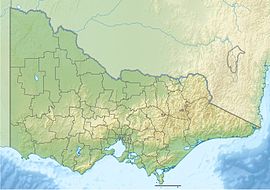Warby Range State Park was a Victorian state park just north of Glenrowan. In 2010, the park became part of the newly declared Warby-Ovens National Park.[1][2] It is 11,460 hectares (28,300 acres) in area, and named after Ben Warby, a pastoralist who settled in the area in 1844. There are two basic campgrounds, and many other sites for true bush camping.
| Warby Range State Park Victoria | |
|---|---|
| Nearest town or city | Glenrowan |
| Coordinates | 36°13′06″S 146°10′52″E / 36.2184°S 146.1812°E |
| Established | 1978 |
| Area | 114.6 km2 (44.2 sq mi) |
| Managing authorities | Parks Victoria |
| Website | Warby Range State Park |
| See also | Protected areas of Victoria |
History
editThe 400 m rocky escarpments are believed to have been used by the Kelly gang as a lookout for robbing wagons loaded with gold, heading to Melbourne and Port Phillip Bay. In 2002, the park was expanded to include the state forest of Killawarra as part of a program of protecting Box-Ironbark forests.[3]
Environment
editThe park is part of the Warby-Chiltern Box-Ironbark Region Important Bird Area, identified as such by BirdLife International because of its importance for the conservation of Box-Ironbark forest ecosystems and several species of threatened woodland birds dependent on them.[4] The ranges run north-to-south, allowing plant and animal species to migrate from the Australian Alps to the riverina plains, Murray River and arid regions.
References
edit- ^ "Warby Range State Park", Official website, Parks Victoria, retrieved 29 January 2012
- ^ Collaborative Australian Protected Area Database CAPAD08, Department of Sustainability, Environment, Water, Populations and Communities, Commonwealth of Australia, 2008, retrieved 29 January 2012
- ^ http://www.nre.vic.gov.au/CA256F310024B628/0/EE53E20E4F7CFC15CA25728F0019086E/$File/WARBY.pdf [dead link]
- ^ BirdLife International. (2011). Important Bird Areas factsheet: Warby-Chiltern Box-Ironbark Region. Downloaded from http://www.birdlife.org on 2011-11-20.
